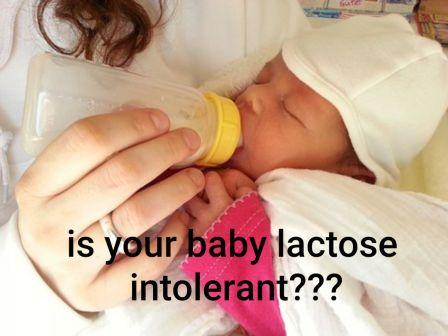Hello Parents..
"Lactose intolerance in babies". Let study what is it exactly:
Lactose is a form of sugar which is mostly found in milk and dairy products. Lactase is a digestive enzyme produced by small intestine and is responsible to break down lactose into a more easily digestive form.
Intolerance is a state, when body is unable to produce enough lactase, leading to undigested lactose which stays in the intestine and causes gastrointestinal problems. These problems tend to be discomfort but not dangerous.
So basically, lactose intolerance means "lack the enzyme lactase", which helps break down lactose, the sugar found in
Probability of occurrence in babies:
Lactose intolerance is rare in children of age group 0-2 years. A baby is highly unlikely lactose intolerant. Babies make lactase, the enzyme, which helps them in digesting breast milk. Lactose intolerance is far more common in older children and adults.
Some of premature babies might have this intolerance as they are unable to produce the desired amount of lactase for a while. Lactase production in a baby generally increases during the last trimester of pregnancy. On a contrary, majority of premature babies are able to drink both breast milk and formulated milk without any symptoms of intolerance.
Factors leading to Lactose intolerance in a baby:
Below are major few of several factors play a pivotal role in determining if baby becomes intolerant to lactose:
Another genetic disorder rarely found is when a baby is born with lactose intolerance, called primary lactase deficiency. This kind of intolerance means that the baby completely lacks the lactase enzyme and is unable to tolerate even breast milk. Such babies are needed to be fed on special lactose-free formula milk right from birth. We don't have studies to show how common this is in India, but it's likely to be very rare.
Symptoms:

Thefollowing symptoms can be observed in a lactose intolerant baby-
6. Frothy stools.
The above symptoms generally occur between 30 minutes to 2 hours post dairy product intake.
In case, baby gets rashes, breathing difficulty, bloody stools or excessive vomiting, then he might be allergic to milk / dairy product. If the baby suffers with milk allergy, he reacts to the protein rather than sugar.
Allergies involve the immune system, but intolerances do not involves the immune system. So it is better to always consult a doctor to get a proper diagnosis
How to ensure if baby is lactose tolerant or not?
Few children show conventional symptoms of lactose intolerance before the age of two or three. However, if baby has diarrhea or appears to have abdominal pain after a feed, always mention it to your baby's doctor.
They'll ask about your baby's symptoms to help determine whether it's a possibility. Ma your doctor suggests to you eliminate all sources of lactose from your baby's diet for a couple of weeks to see whether his symptoms subside.
If you're breastfeeding, you will be asked to remove any sources of lactose from your diet to check if that helps. The doctor may do further investigations or refer to a dietitian for dietary advice if needed.
Can it be prevented in babies?
No, but there are certain alternatives you may want to use that'll help a lactose intolerant baby.
In case baby has temporary lactose intolerance:
Breast milk, formula milk or dairy products are not to be stopped in case of temporary lactose intolerance unless his symptoms are very severe. Low lactose formula will likely be advised if the stools are not settling down.
Nevertheless, consulting a doctor is recommended for further advice.
In case baby has permanent lactose intolerance:
In a more permanent form of lactose intolerance, a specialist advice from a doctor is always recommended.

